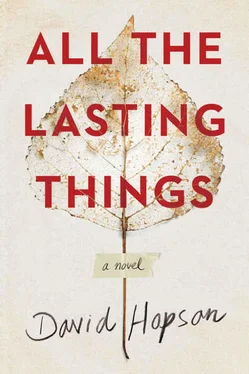Freed in the end from only a few less cumbersome pieces, Benji left the molted armor on the ground, continuing on through a stand of tall, thin trees that opened, high above, into umbrellas of sparse pine boughs. As he approached the dark bridge, he nearly fell, his feet sliding slapstick style through the dirt and rot of the forest floor. In the light of day, the bridge, built just wide enough for a ranger’s jeep, looked barely capable of supporting a ranger. It was a miracle it hadn’t fallen into the ravine years ago.
His efforts to stay upright had him panting, and a trickle of sweat, fed by the efficient furnace of the cuirass, rolled maddeningly down his unscratchable back. He took a cautious step, ears trained for the first sigh of splitting planks, but heard nothing. No wind. No traffic from nearby Route 4. Nothing but a drunken blood gush pulsing in his own ears. A few stars winked through the broken lattice of branches, and it was under these fair lights that Benji’s stomach staged its revolt. In one great heave, up came what remained of his lunchtime spree. It splashed over the railing and coated with vile chunks the leaves of a small, dry bush.
This was not the life he intended to live.
As quickly as his tuna melt rushed out, a stream of regrets rushed nastily in. Benji had no trouble making himself the subject of his own entertainment television interviews, speaking at length — in the shower, in line at the bank — about the movies he had yet to make, the theater he had yet to do, the awards he had yet to win, the accolades that had yet to be bestowed upon him and that would, by some strange alchemical process associated with fame, be transmuted into contributions to the world that mattered. What would he be remembered for? What would his legacy be? What of him, beyond the movies and performances and awards, would last? Saving the children. Saving the ice caps. Advocating clean, available drinking water across the developing world. Condemning industrial farming. Condemning violence against women. Condemning war. Condemning fossil fuels and marriage inequality and elephant poachers on the Kenyan plains. But here he was — more or less halfway through life’s journey, with what to show for it? The question came in his father’s voice: What the hell is your plan?
Whenever Henry Fisher accused his only son of aimlessness (or worse), Benji’s mother swept in with the word “unconventional,” brandishing it like a shield to cover him from dragon’s fire — Benji isn’t flighty or feckless or retarded, he’s unconventional —but it was exactly the lack of the conventional trappings of adulthood (at least the kind most often clung to by straight, middle-class, white American males) that so often made him feel worthless. He had no wife, no children, no savings account or stock portfolio, no house, no car. He didn’t have a BA. He didn’t even have a cat. His filmography read like a joke. His credit cards should have melted from overuse. And what had his recent forays into theater, into more serious (and, he’d wrongly thought, more easily had) work, earned him besides two DUIs and, outside a small dinner theater in the Catskills, a charge of disorderly conduct? He could forget about Ophelia kissing him.
Now, with the floodgates of self-pity opened wide, he saw the stupidity in abandoning a show in which he’d gotten a (minor!) part only because his doubtful and already fed-up agent had pulled enough strings to make Pinocchio dance. And even though Hamlet offered parts that were more minor, it must be said that no one in the cast was more expendable. Even poor Gary Jeffries, whose Bernardo, according to the arts section of the local Gazette , seemed no less wooden than the battlements he stood upon, would be missed more than Benji.
There would be no ghost? On the contrary. By this time, Kay and her clones would have grabbed Benji’s concave-chested understudy (a boy half his age and built more like reedy Gertrude than King Hamlet), dusted his face with powder, and, working around the missing armor, cinched him improvisationally into the murdered monarch’s nightshirt from act three. And all this before Gary could mumble, “Who’s there?” Of course there would be a ghost.
No sooner had these thoughts raced in for another round of pummeling than a second seismic heave doubled him over. This one, though dry, brought Benji to his knees. Tears rolled from his eyes as he retched and spat and wondered at the gaping black space on the other side of the railing. To jump or not to jump, that is the question. He pulled himself upright, stood with his hands on the moss-furred rail, and, hanging his head, allowed himself to sink deeper into the darkening thought. But, no. His aversion to diving off a bridge, like his aversion, in 1988, to swallowing more than two of the handful of Valium he’d stolen from (and, as soon as he woke up, returned to) his father’s medicine cabinet, pointed precisely to his capacity for what George Simonson, his former therapist, called self-dramatization. George knew it. Benji knew it. Where was the Hemingway in him? The Freddie Prinze? The Kurt Cobain? He could never check out like a real star, staging a good, old-fashioned, indelible fuck-you of a good-bye.
Maybe the melodrama currently embroiling him made him lift his imploring eyes to heaven; maybe he was merely gauging the time (that is, the likelihood that Seth the Ex-Swimmer would still be manning his drug kiosk) by the dying light. Whatever the cause, Benji looked up. Looked up to see the moon of his most morbid thoughts eclipsed by what appeared to be an apple, hanging just out of reach on the opposite side of the railing. A tree from the right bank of the ravine leaned at a remarkable angle over the gorge, as if stalled in the process of falling. From it dangled a single piece of fruit in silhouette, a black cutout against the darkening sky.
The uncomfortable heat that came from hating himself dissipated in the cool breeze of a gentler memory. It was October. His birthday. 1981. The day before his mother flew him to Los Angeles to play a publicly maligned but essentially loveable humpback opposite young Melissa Gilbert, his father had broken form and proposed a family trip to an apple and pumpkin farm just the other side of the Vermont border. Thanks to Henry Fisher’s inflexible writing schedule and the ill-timed arrival of his sister’s first period, the family got a ridiculously late start, arriving at the orchard just as all the other families were packing their soon-to-be jack-o’-lanterns and paper-handled apple sacks into their cars.
Living by a clock that had little to do with daylight or other people’s watches, Henry grabbed a bushel basket and, despite the protests of a teenaged employee whose lanky frame and protuberant Adam’s apple did not escape the writer’s critical eye, started down a tractor-rutted track into the orchard.
Benji blanched. “Dad,” he pleaded, “we’re not supposed to. They’re closing.”
“If Ichabod Crane wants us,” Henry Fisher said, “he can come get us.”
Evelyn offered a few words of encouragement to her mortally embarrassed daughter, but Claudia refused to lift or reach or do anything that would either please her mother or raise the knee-length sweater she’d put on as extra protection against a foreign and untrustworthy pad. The basket the women carried — for, though practically paralyzed by her body’s pubescent treachery, Claudia reminded everyone that now, officially, she was a woman — rattled with a few sad apples, moodily picked from the ground, while the men’s overflowed with Cortlands, Empires, and Ginger Golds.
Benji scurried in his maroon Roos onto the lowest branches, stripped them like a starving child, and dropped the bounty into his father’s waiting arms. Only when a tobacco-voiced farmer, trailed by Ichabod’s emboldened form, appeared to discuss insurance liability and, worse, call Henry friend did Henry relent. Every man had his limits, and false fraternity marked Henry’s. He put down his basket and waved the farmer away. Father and son carried the brimming harvest together, straddling a puddley, tire-scored ditch. It was one of the few uncomplicatedly pleasant memories of Henry that Benji could summon for George Simonson. And more than once during those $150 sessions that Benji could no longer afford did he return to that final moment, when, passing under a tree silhouetted against the inky sky, he noticed the day’s last apple, almost Edenic in perfection, waiting, it seemed, for Benji to pick it. Which he did, sitting atop his father’s shoulders, and promptly, greedily, bit into.
Читать дальше












